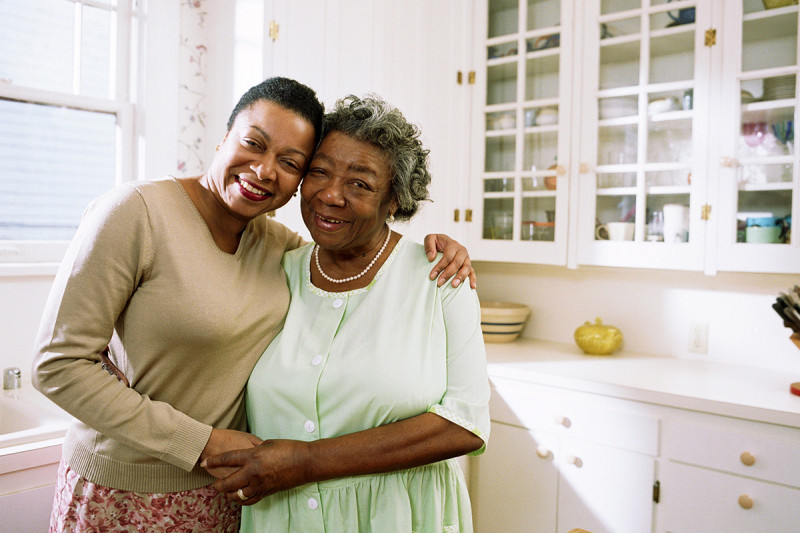
It can be helpful for caregivers to acknowledge the positive aspects of their role.
In the overwhelming whirlwind of appointments, tests, and decisions surrounding a loved one’s cancer diagnosis and treatment, caregivers can lose track of themselves and their own needs. “Caregivers can feel invisible,” says Memorial Sloan Kettering clinical social worker Annamma Abraham Kaba, co-coordinator of the Department of Social Work’s Caregiver Program. “And yet they’re increasingly the bedrock of the healthcare system.”
“Caregivers are valuable to our culture and to our institution,” says clinical social worker Linda Mathew, co-coordinator of the Caregiver Program. “As providers, we want to empower, support, and underscore to caregivers their value and recognize how important they are to patient care.”
Ms. Abraham Kaba and Ms. Mathew recommend the strategies below to help you cope with some of the pressures of caregiving.
Accept help.
The stress that comes with caregiving is unavoidable. Recognizing you need a hand is a crucial first step — and so is giving yourself permission to take it. “Obviously, caregivers are busy helping their loved one,” says Ms. Abraham Kaba. “They’re really motivated and committed. However, they can experience roadblocks to their own self-care. Lack of time, resources, and sometimes guilt about relying on others can sideline caregivers’ ability to take time for themselves.”
It’s important to acknowledge that sense of guilt and to not feel judged about having needs. “Accepting help is not a sign of personal failure,” she says. “If you have family members and neighbors saying they want to help and asking how to do it, take them up on their offer. Discuss with them ways they can support both you and the patient.”
Start by identifying what it is that overwhelms you the most. “Do you just want to talk to someone, or are you burned out? Do you need someone to help you with the children? It can encompass things from the very practical to the very emotional,” says Ms. Abraham Kaba.
Back to topCreate boundaries.
The sheer volume of information to absorb and choices to make can leave caregivers feeling as if everything is spinning out of control, especially if they have been caregiving for some time. It’s important to recognize your limits, whether by setting aside time to focus on your loved one or taking a break to understand why you’re feeling overwhelmed. It could be as simple as scheduling appointments at times that fit into your work schedule, rather than accommodating whatever options you’re given.
“It’s about setting boundaries, which can be hard to do,” says Ms. Abraham Kaba. “It’s saying to yourself that you’re allowed to have limits.”
Back to topSeek support from fellow caregivers.
Talking with others who can relate to your situation can be a huge help. Attending in-person or virtual support groups gives caregivers a voice: “It’s a place where they can share what they need to share without feeling judged,” Ms. Mathew says.
At Memorial Sloan Kettering, participating in a caregiver support group couldn’t be simpler. “We have folks plugging in from their car on their lunch hour,” says Ms. Abraham Kaba. (To register for a virtual group, send an email to virtualgroups@mskcc.org)
Topics discussed cover everything from the isolation and guilt of caregiving to the role reversals that can occur, like when a child is caring for a parent. Other caregivers understand that there are so many emotions wrapped up in caregiving — including good ones. These groups are also a good forum for difficult or complex discussions about things like financial struggles, existential issues, and finding meaning. “Participants talk about the real stuff,” says Ms. Mathew. “When they’re able to talk about it with the other caregivers, it’s not as scary.”
Back to topHave the difficult conversations.
Once you’ve gotten that support from other caregivers, try to have those serious talks with your loved one, if he or she is open to it. “Initiate the conversation about the patient’s ideas on quality of life, DNR orders, or how to communicate with your children about the progression of the disease,” says Ms. Mathews.
If your loved one is facing a metastatic diagnosis or is at an end-of-life stage of the illness — and is comfortable addressing it — discussing final wishes can help relieve anxiety for everyone. “It’s OK to have that conversation,” says Ms. Abraham Kaba. “You’re not causing your relative undue stress. He or she is already thinking about it, too.”
Back to topTry to create moments of connection and pleasure.
“As important as those heavy discussions are, it’s also good to acknowledge the positive aspects of caregiving, such as the deepening of your relationship with the patient, the strength you gain through adversity, and your own personal growth,” says Ms. Mathew.
Finally, be aware of your thoughts, which can distract you from the present. “I call it chatter,” says Ms. Abraham Kaba. “Be mindful of the thousand thoughts that are running through your head, because they can rob you from the experience of right now.”
Back to top



